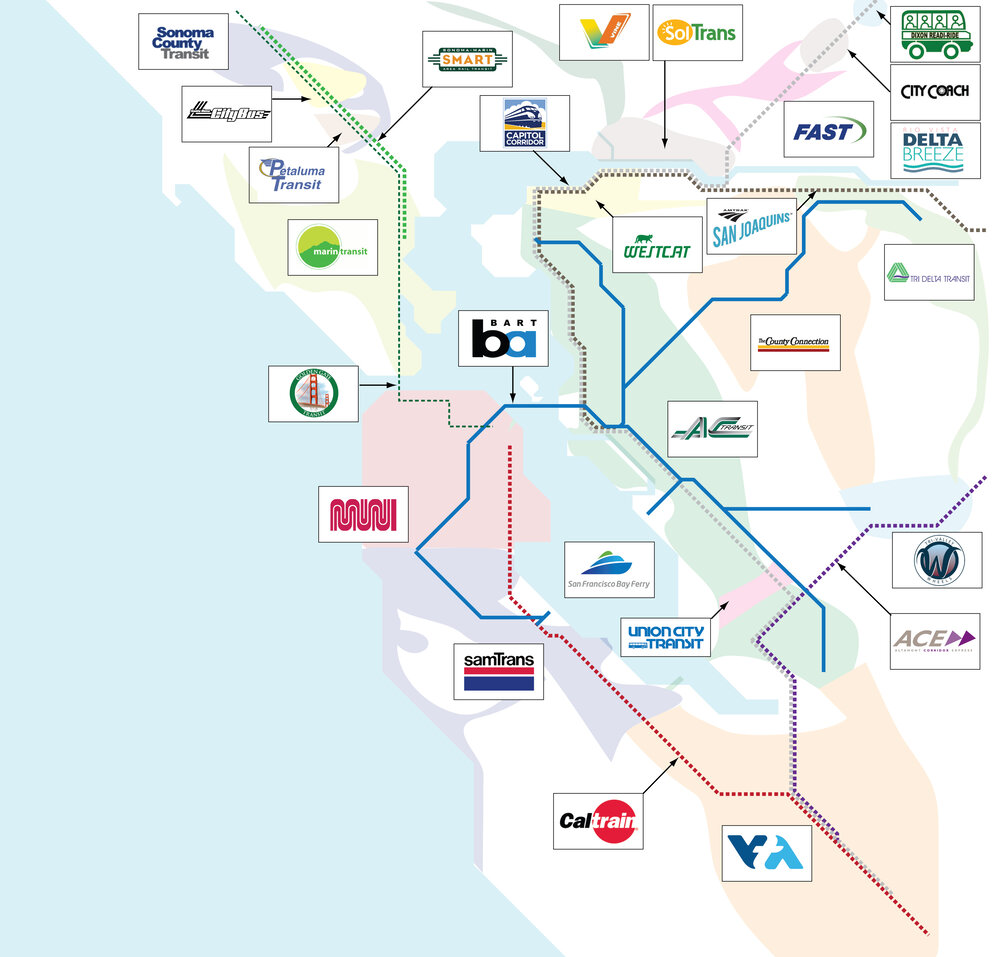Senate Bill 917, the Seamless Transit Transformation Act, died last Thursday in committee. This is a serious bummer for supporters of an integrated, rational transit system for the Bay Area. As the bill's author, Josh Becker, and its co-sponsors at Seamless Bay Area tweeted below:
Bay Area transit continues to be a work in progress by 27 agencies. #SB917 sought to provide riders with #SeamlessTransit & a passenger experience akin to the world’s best. I’ll still work toward this goal.
— Senator Josh Becker (@SenJoshBecker) August 11, 2022
TY @seamlessbayarea & transit advocates.🚋🚌🚆https://t.co/pTiC9BEjSh
Thanks to the advocacy efforts of Seamless Bay Area, one initial element of an integrated transit system—the creation of a pass that works across different operators—is moving going forward despite the bill's failure. The Metropolitan Transportation Commission has launched a two-year pilot program for a universal student pass that will work on all Bay Area operators that use Clipper. From an MTC release:
Known as the Clipper® BayPass, the new passes initially will be distributed to participating students at San Francisco State University, San Jose State University, the University of California's Berkeley campus and Santa Rosa Junior College, and then expanded to include residents of select affordable housing communities managed by MidPen Housing. While the Clipper BayPass will be made available to all students at Santa Rosa Junior College, about a quarter of students at the other campuses will be invited to participate in the pilot. Other students will use another form of payment (such as a standard adult Clipper card; U.C. Berkeley's EasyPass for travel on AC Transit buses; or San Francisco State's Gator Pass for free travel on Muni and SamTrans and reduced fares on BART). This limited distribution, which will be based on random assignment, is designed to measure the impact on travel of an all-system pass when compared to students not using Clipper BayPass. All residents at participating MidPen Housing properties will be offered a Clipper BayPass.
"The rollout of the BayPass - our region's first ever truly unlimited transit pass, valid on all of our transit services - will transform how people travel and think about using transit," wrote Seamless Bay Area's Ian Griffiths in an email to Streetsblog. "Anyone who's had a monthly pass knows how it impacts your decision to use transit more often - once you have a pass, each additional trip is basically no cost to you. While making this pass available to anyone for purchase is the ultimate goal, the first step is piloting it among smaller populations to test it out. Piloting this pass among students and residents of affordable housing communities will both provide immediate access benefits to thousands who depend on transit, as well as provide us with valuable data on how the pass changes people's travel behavior. This is especially exciting because it's the first tangible action from the region's Fare Coordination and Integration Study, and the result of years of advocacy from riders who have been calling for integrated, fairer fares."
"This pilot program is an exciting step toward fare coordination among transit agencies and toward making it easy for organizations to prioritize and promote transit as the preferred mode of transportation in the Bay Area," said BART Board President Rebecca Saltzman in a statement. "Studying a regional fare pass using students and residents of affordable housing communities makes clear our commitment to building a more equitable fare system."
It remains unclear why S.B. 917 never got off the "suspense file" in the Appropriations Committee, leading to its downfall. Decisions about which bills are released from the suspense file are made away from the public eye and the reasoning behind them is rarely disclosed publicly.
Regardless, the hope is that if a regionwide pass increases ridership without causing transit Armageddon, perhaps individual agencies will finally get behind real transit integration. Then the goals of S.B. 917 can be achieved via MTC--which is supposed to be the coordinating agency for Bay Area transit--without the legislation.
"Advocacy directed at MTC and transit agency boards is needed now more than ever to stay on track toward transit transformation. Creating a permanent network manager is now even more important. We shouldn’t have to legislate seamlessness - institutions should be set up to deliver it," wrote Seamless Bay Area on social media.






